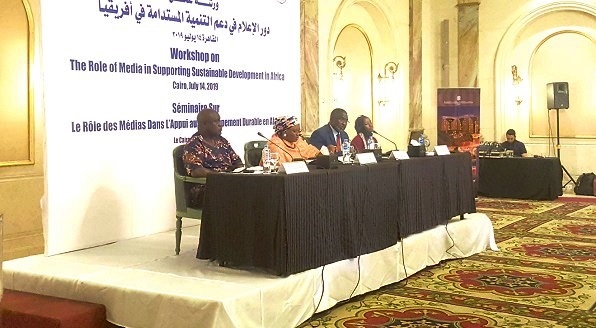
Journalists at Cairo forum call for greater collaboration
For some time now, African journalists, government officials, civil society organisations (CSOs), other organised groups and nationals have expressed deep concern about the manner in which news about Africa has been presented.
Various fora have been organised in recent times to discuss negative reports about the continent, with a view to finding ways to address such misinformation, exaggerations, half-truths and untruths about the continent.
Advertisement
It was along this same line that about 40 senior journalists from about 38 African countries recently attended a workshop organised by the Egyptian Agency of Partnership for Development (EAPD) in Cairo, Egypt.
The workshop on Media and Sustainable Development provided a platform for the journalists to discuss freely and frankly the causes of these negative reportage, so as to find ways of addressing the situation.
The workshop noted that until African media or journalists themselves woke up to delve deep into what happened in their individual countries and report on them from the African point of view, the continent would continue to be portrayed negatively.
Journalists and presenters at the forum agreed that there was the need for greater collaboration, training and networking among the media within their countries and among the various countries.
They said there was also the need to support the media, particularly state-owned media to be able to stand on their feet and hold our governments accountable to the people.
Event-focused
African media which are event-focused must also move away from that mode of reporting to more of investigations, issues and research to give better insights into the materials we present out there.
Participants agreed that there was a need for an effective African news agency that will gather news about Africa from an objective point of view.
The workshop further stressed the need to do away with the barriers from one country to the other, which have made travelling from one African country to the other to gather information more difficult than travelling from Africa to another continent.
Making a presentation on the ‘Impact of the Media on African Economic Integration’, the Managing Director of the Kenya Broadcasting Corporation, Dr Naim Bilal, observed that reportage by African media was limited and stressed the need to equip journalists.
He regretted that the trend in Africa was that state media, particularly the national broadcasters, were dying and called on African governments to support them.
Dr Bilal said in order that the media could play their expected role in the development of their respective countries, both the governments and the media needed to understand policies, treaties, laws and issues for them to be able to inform the public.
He mentioned the Customs Union, the African Continental Free Trade Area (ACFTA), its membership and functions and other continental blocs and conventions, and said the media must understand these very well, so that they could break them down for their readers, listeners and viewers.
“The media must be active and present quality content in form and presentation, adding that this raises the question as to whether the media was providing the required service or covering news on economic integration’.
The missing link
“This again poses the question whether the media themselves are not the missing link,” he asked?
In his presentation on ‘The Role of the Media in promoting African relations at the bilateral and continental levels”, the Advisor to the President of Rwanda, Mr Joseph Rwagatare, expressed concern about the negative reports that were always presented about Africa, leaving the positive things out.
He pointed out that a lot of development went on on the continent, yet reports focused only on those which put the continent in a negative light, saying that Nigeria is not only about Boko Haram, neither is Somalia just about Al-Shabaab.
Speaking on the New Media and Social Networking, a journalist with The Reporter newspaper in Ethiopia, Mr Samuel Gatachew stressed the importance of social media and said it was important that the real facts were always presented.
He emphasised the power of social media and how fast news through social media could spread, and regretted how through just one accusation that a journalist was a spy, he was killed.
In his presentation on media coverage of terrorism, an expert at the Al-Ahram Centre for Political and Strategic Studies, Dr Amira Abdel Halim, stressed the need to first of all redefine the role of the media in Africa and said we must avoid fake news and use the media to address issues on terrorism with the continent.
He urged the media to highlight the activities and effects of terrorism on the development of Africa.
Other speakers included a South African Radio Journalist, Mr Phanuel Shuma, and the Director of State Television of Nigeria, Ms Fatima Abbas Hassan.




